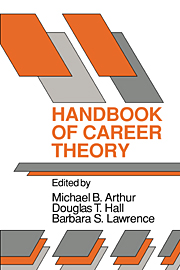Book contents
- Frontmatter
- Contents
- List of contributors
- Preface
- PART I CURRENT APPROACHES TO THE STUDY OF CAREERS
- PART II NEW IDEAS FOR THE STUDY OF CAREERS
- PART III FUTURE DIRECTIONS FOR THE DEVELOPMENT OF CAREER THEORY
- Introduction to Part III
- 23 Understanding individual experience at work: comments on the theory and practice of careers
- 24 Propositions linking organizations and careers
- 25 Careers and the wealth of nations: a macro-perspective on the structure and implications of career forms
- Name index
- Subject index
25 - Careers and the wealth of nations: a macro-perspective on the structure and implications of career forms
Published online by Cambridge University Press: 05 June 2012
- Frontmatter
- Contents
- List of contributors
- Preface
- PART I CURRENT APPROACHES TO THE STUDY OF CAREERS
- PART II NEW IDEAS FOR THE STUDY OF CAREERS
- PART III FUTURE DIRECTIONS FOR THE DEVELOPMENT OF CAREER THEORY
- Introduction to Part III
- 23 Understanding individual experience at work: comments on the theory and practice of careers
- 24 Propositions linking organizations and careers
- 25 Careers and the wealth of nations: a macro-perspective on the structure and implications of career forms
- Name index
- Subject index
Summary
On a street near my house, a car is parked with a provocative pro-peace bumper sticker: “One nuclear bomb can ruin your whole career.”
Arresting as that sentiment is, it does point to a neglected issue in most writing about careers – the relationship between careers, a phenomenon conceptualized at the individual and occasionally the organizational level, and major events or consequences at the societal level.
Of course, it is hard to deny that cataclysmic or history-shaping events have important consequences for employment and thus for careers – war, famine, drought, international monetary crises, scientific discoveries that launch new professions, technological breakthroughs such as the invention of the telephone or microprocessor, civil rights movements, labor battles, or even a wave of corporate takeovers. But it is harder to find, in the literature about careers, the more subtle connections between careers and economic, social, or political issues within that society. And practically non-existent is any attention to the ways in which the structure of careers in a society, via the organizations that help form them, might play a role in outcomes for whole societies – for example, in aggregate health of the population or in the productivity or job creation capacity of the economy.
- Type
- Chapter
- Information
- Handbook of Career Theory , pp. 506 - 522Publisher: Cambridge University PressPrint publication year: 1989
- 83
- Cited by



